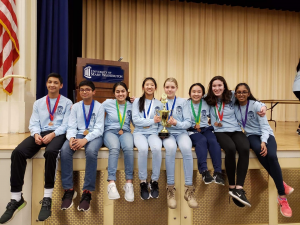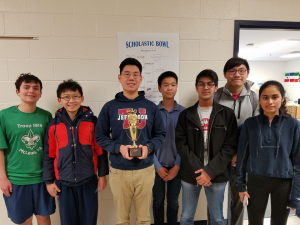Contests During Covid: How Competitive Spirit Continues on!
Image courtesy of Adobe Stock.
Contests now use virtual conferencing to operate during the pandemic. It may sound convenient, but it comes with risks, including that it’s easier for participants to use the internet to cheat.
December 14, 2020
With the pandemic comes many changes. Changes to college admissions, how we go to school, how we socialize, how we play sports, and how we compete in contests. Despite not being able to host in-person contests, different organizations have been putting together tournaments like History Bowl Nationals, the ERIS quiz bowl tournament, Science Olympiad, and USABO.
Particularly for Science Olympiad, this year’s competition several differences from their contests in the pre pandemic era.
“Science Olympiad is running several different styles of tournaments this year. Jefferson’s team will be competing in MY Science Olympiad tournaments, which are run on an online testing platform created for Science Olympiad — it’s called Scilympiad. As with many other activities this year, our tournaments will be fully virtual,“ said sophomore Emma Cox, an officer of the Jefferson Science Olympiad club.
Most tournaments have decided to use an online platform to host contests. Students don’t worry as much about transportation, but organizers may face logistical issues when trying to monitor how participants are competing.
“One positive that comes out from doing this is that we’re able to compete all across the country without spending a dime on transportation,” Cox said.
Students are also able to stay in the comfort of their home during contests, and the need to wake up early to travel long distances in a car ride is gone.
However, when a tournament is organized online, concerns about competitors’ integrity arise. Quiz Bowl in particular has a specific term for people who search up facts for answering problems: biking. If officials suspect that a participant has “biked”, your team might be disqualified from the tournament and that participant will suffer a permanent ban from all of the contests. This has become a serious problem, as one person in History Bowl Nationals was caught biking during many of the rounds. If one person cheats and wins rounds with an unfair advantage, the whole tournament bracket must be altered.
Working over the internet also creates difficulties when preparing for the contest.
“The contest is still in the same format but I believe communication between partners is made somewhat more difficult because of the lack of face-to-face interaction,” sophomore Abhinav Angirekula, a member of the Jefferson public forum debate team, said.
Despite what may seem like great changes in the academic competition system, students are still determined to do well and succeed in their respective areas.
“Regardless of whether we come back or stay virtual the entire year, I know that all of TJ’s wonderful academic teams will have an amazing time at each of their tournaments, and hopefully get some good experience that they can use in the future,” Cox said.


![With the move to virtual competitions starting in Month, senior Joshua Lian uses Discord to run and participate in Quizbowl tournaments. “[Discord] was already being used by much of the Quizbowl community to run online tournaments. It blossomed and developed into a full fledged thing once the pandemic locked everyone at home with no way to get tournaments,” Lian said.](https://www.tjtoday.org/wp-content/uploads/2020/11/discord-peace-featured-image-300x225.png)






